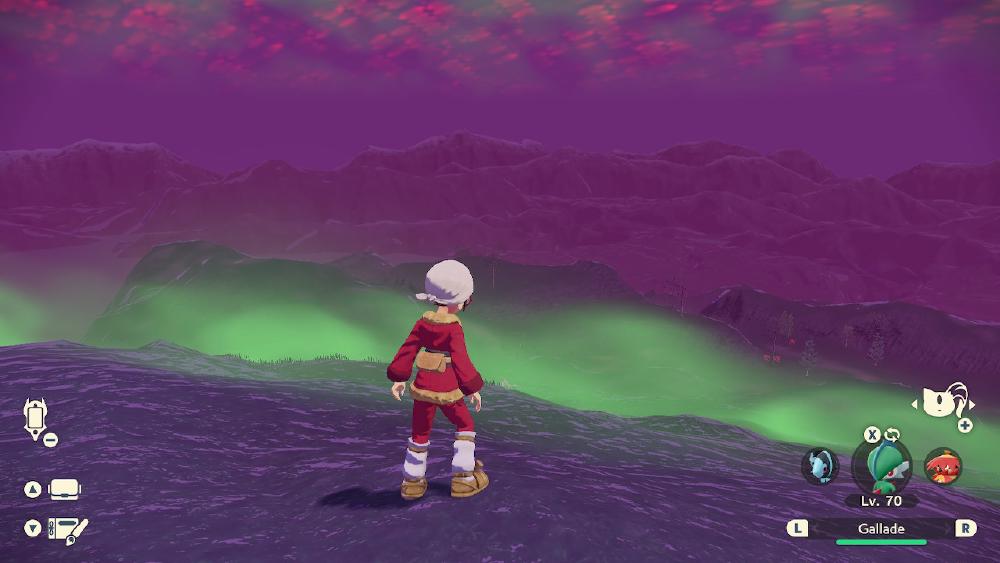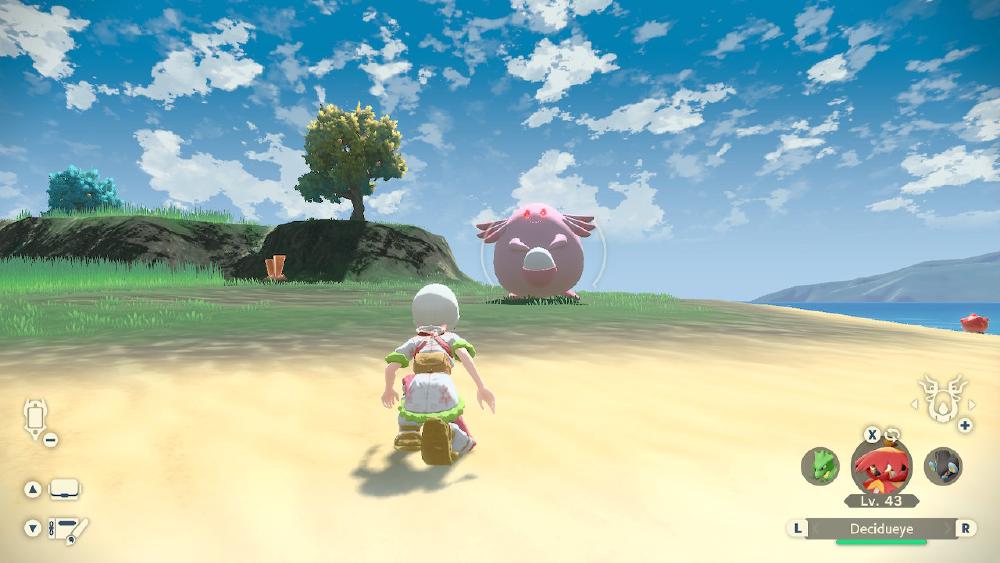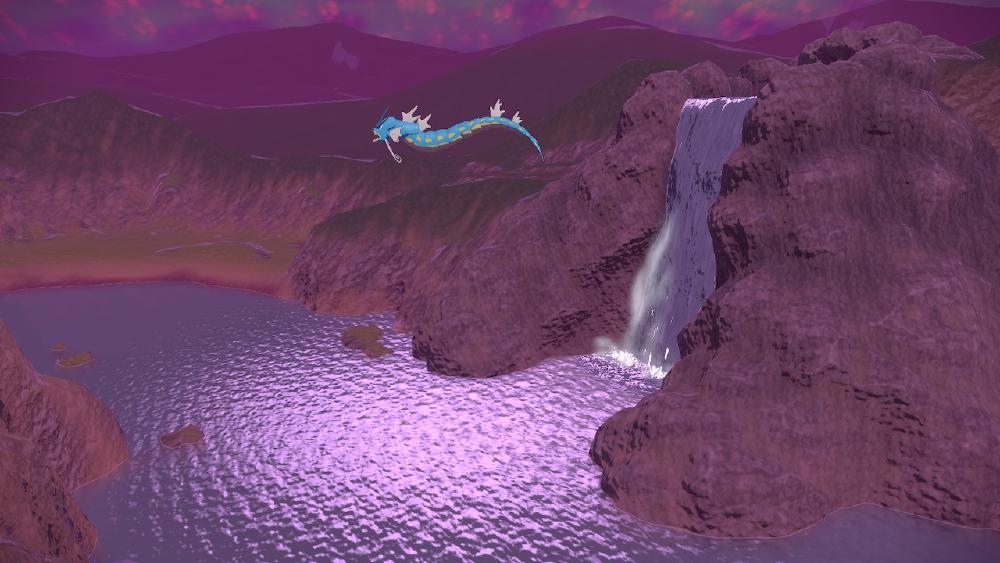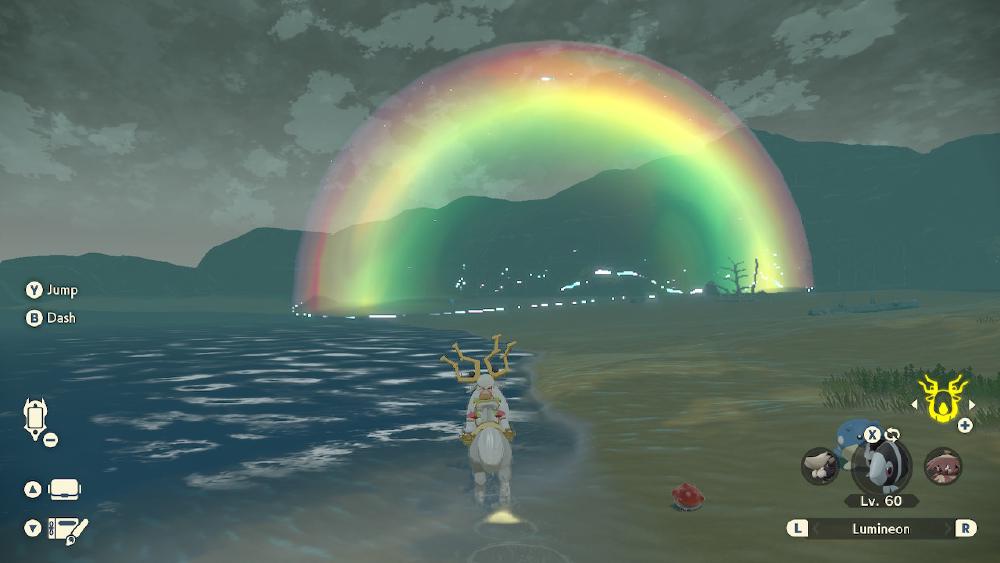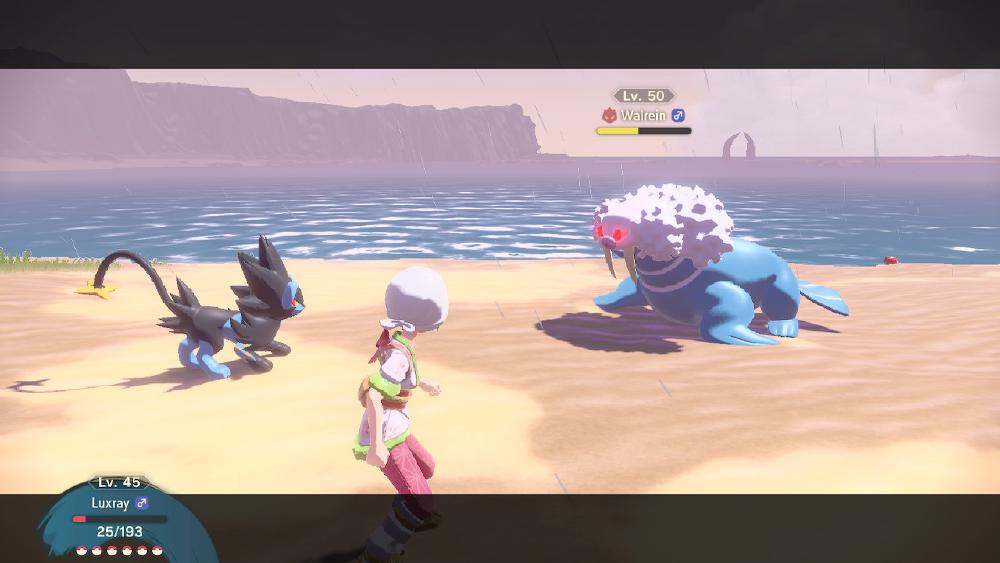
Pokemon Legends: Arceus
Made by: Game Freak
Publisher: Nintendo, The Pokemon Company
Platforms: Nintendo Switch
Release date: 28/01/2022
Review date:
Emoji summary: 🌎🌠🥰
Review by: GDLP
Spoilers: no story spoilers, just mechanics
Ever since I learnt about Pokémon, I’ve had two versions of it in my mind.
One version has been based around the full world imaginary that the lore of Pokémon presents. I’m thinking about the core of this whole thing: the exciting alternative universe where people have animals all around them, animals that are somehow more alive than the ones we know on our planet. These are creatures imbued with magical abilities that can be elemental or stranger than that: they come in types like psychic, dragon and ghost. They all look so different according to their species and where they can be found in the landscape, and hundreds of Pokémon have been discovered so far. We can spot them in tall grass, forests, oceans, mountains, labs, lava, and even flying past us in the sky.
This sprawling, lively vision is the version of Pokémon I have always loved. From childhood, I subscribed to its mythology. I dreamt of catching and keeping little sidekicks; imagined living with them, working with them, training them for sport and glory. I just think I would find so much enjoyment in a world where wilderness and civilisation overlap like that — but instead I live in England so I just have to get a cat, some plushies, and do with. God, there are plenty of imagined worlds I wish I could escape rope to but Pokemon continues to be my preference. It’s just so loveable and warm.
So, that’s one of the versions, anyway. The other version of Pokémon I have in mind is the one I know directly from the main game series. Now, I have dutifully played through almost all of these titles from Red and Blue to present day, putting more hours into this franchise than anything else by far, graduating with Pokémon through generations of consoles. But as much as I have enjoyed my time with these games, they have consistently taken the fiction of Pokémon and flattened it into brief, easy, strategic RPGs that have felt a little less loveable than the idea of the world I’ve had in my head this whole time. To carry on talking animals, it’s very much been like a butterfly pinned down in a museum exhibit, keeping its colour but none of its liveliness; I feel like it’s been my job as the player to project a soul onto the limp thing I’ve been given, to basically convince myself its alive and meaningful.
That might be too dramatic a metaphor but I’m going to roll with it, because maybe it’s not just me. When you looked down at the green, un-lit, dot-matrix screen of the original Game Boy, did you imagine the game world inside the console was green, dark and flat as well? Some games definitely felt that way, pinned behind the plastic. But when I think back to the earliest Pokémon titles, I remember an experience that was much more involved. In my memory, those games had a colour and a depth that wasn’t even possible on the Game Boy. The plastic screen was a tiny portal all of a sudden. And yet, I projected dimension and detail onto the images I saw anyway; I did what you might do when you imagine the face of a character in a book, someone whose description only actually exists in words.
According to my memory, my over-active childhood fantasy, I really did see the red and white Pokéballs I had to choose from on Professor Oak’s desk, the one at the end of a long wood-panelled room. I really did claw my game-way through a maze of a forest, and then slog, heavily, slowly through a blacked out cave. The towns I visited between these geographies weren’t simple, monochrome stop-offs. They were arranged well, with coloured rooftops over buildings, and neat hedges and fences that gave the whole place a shape. Patches of flowers danced with the wind. The water lapped against the boardwalk. I knew these maps, I knew where to go, and I knew where everyone lived. And even though I couldn’t have done this next part, I half-remember navigating the game through the eyes of my avatar, and not from my outside, human, top-down view.
I was a kid making up stories on the school yard based on the shapes and lines of paint on the floor. The battles weren’t turn-based text-based actions but explosive and tense instead, scenes more fitting of the word ‘battle.’ And the Pokémon themselves weren’t coated in that grey-green effect of the Game Boy screen. Squirtle was wet and and cute and blue, Dewgong was a milky clownish white, and as far as I remember, Moltres was definitely on fire.
No, I only think I saw those colours in the colourless Red and Blue games and I only think I travelled the breadth and depth of Kanto. When I was young, I so badly wanted the world of Pokémon to be real — and honestly, I still do — that I played the games with all this extra imagination to make them so. And the thing is, the projections did not end there. I grew up and watched the capacity for art and game design become more impressive and immersive. Games became these big, mad, exciting kaleidoscopes. Acutely fictional and yet convincingly real. I played other titles where I could walk freely through artwork and see a story happening from all angles, up close; take my own directions; make my own decisions and deal with my own consequences too. But while so many other studios took advantage of technological developments, the main games in the Pokémon series stayed politely and carefully the same. They stayed feeling old.
The games evolved in their own ways, with plenty of new features added to make battles especially more genuinely strategic and fine-tuned: natures, EV training, held items, abilities, double battles, temporary evolutions and so on. But it’s like they just made the knot in the game tighter and tighter, they made the knot more complex, when they could have taken those knots and cast the net wider instead. So as much as I have enjoyed the formula, it has become rigid, repeatable, known. The tightness and the flatness of the gameplay and design has never quite suited the story anyway. I have continued playing because I have also continued to project my own version onto the games. I wish I didn’t have two versions going on. I just want a single game that makes everything happen in one place, in one way — in a colourful, energetic, fantastical way that honours the story. I want the game I think Pokémon is but every time I load it up I hit a wall because I’m still waiting for the game I’m dreaming of to come true.
The new Pokémon Legends: Arceus game… is not it. But it’s so close. It’s closer than we’ve even been, closer in a way than that summer everyone played Pokémon Go and it really showed the main series up for its oldness. And although it isn’t exactly what I have been hoping for, it shows that the series is finally on its way to the kind of game I want — and that is enough to make me feel vindicated after all these years holding out hope. I feel romantic about it, happy and good. I never thought a Pokémon game like this would come! I really enjoyed playing it for all its difference.
Arceus is a prequel set hundreds of years before the games we’ve played so far. The game is a 3D adventure that isn’t quite an open world but it is more open than a Pokemon game has ever been. You, the player, have dropped out of a strange time-space rift in the sky. You’re wearing modern clothing, you’ve lost your memory, and a mysterious voice gives you a special phone-looking device and proceeds to ask that you find every Pokémon in the land. Deal? You find shelter and time-appropriate clothing in the nearest village — Jubilife village, which Diamond and Pearl players might know as one of the cities in the Sinnoh region.
Here, you start to work for your keep by helping with the research the village is doing because it just so happens to match up with what the voice told you to do. The villagers are studying Pokémon. In fact, they are building the very first Pokédex, an encyclopaedia that will contain all the information we have on these elusive creatures. Most people are pretty scared of Pokémon — they’re curious but more cautious than curious, generally staying in the village where they feel safe. The dedicated Survey Corps team amongst them are tasked with venturing out into the wilderness, with the hope being that if they gain knowledge of Pokémon they can calm everyone’s fears and find a way to live and maybe work alongside them. To this end, they’ve just invented the very first Pokéballs. They are wooden, made with apricorns and tumblestones. Everyone’s still a bit wary of using them, except you, so you join the Survey Corps and head out to see what you can see.
The framing and position of the prequel allows for a much more compelling game to be produced; to be there at the very beginning of people’s relationship with Pokémon brings an inherent challenge and an inherent wonder to the story. For players like me who have been here this whole time, and all the other grown up fans I’m assuming, it makes me feel like I’m back at the beginning again. It seems to have given the studio permission to start over as well, as they’ve made some big changes across all aspects of the game — finally.
Gone are the short, thin, up-down-left-right routes of the past. There are now much larger wild areas to explore with less defined edges, as the game world in Arceus is one before total, networked civilisation. The emptiness in the space outside of the village — and the lack of other settlements — creates an atmosphere that is more organic. Here, we run through different climates where the Pokémon roam freely. We can watch them roll around on the beach or plod through a swamp. We can see them — they aren’t hidden in grass. And when they see us, sometimes they’re not fussed, sometimes they leg it, and other times they charge. Pokémon can get so mad at you for being in their space that they attack you, the trainer, not the Pokémon you have with you. The only time I fainted in my playthrough was because a Pokémon knocked me out, not my team in battle.
Vast wilderness puts into perspective how contrived and bordered the wild areas were in previous games, and how restrained the games have been for Pokémon to have never gone for our necks like this before. All the other games have been safaris and now we’re in with the lions before safaris were ever invented. The game comes off as more unstable because of these simple changes, and I think it’s a good thing that Pokémon moves away from petting zoo vibes.
Because this story is so focused on the Pokédex, it really places Pokémon at the centre of the whole thing. Duh, name of the game. But in the past, the Pokédex has only been this optional task for people who really care about it. I didn’t always try that hard, and when I did, I didn’t pay that much attention to what I was actually catching because it was just a number to tick off. I stuck to the Pokémon I liked the best and I ignored so many others. In Arceus, we can catch something to add it to the dex but only once we have done 10 studies on a Pokémon is its entry complete. That might involve catching it a few times, battling it, defeating it with certain moves or at particular times of the day, feeding it, or spotting different forms and sizes. The only way we really make money in this game is to submit our research, because there are no random trainers everywhere to grind with. But completed entries equal more money. We can level up our Pokédex to receive special stars and higher rates of pay, which is this game’s rough equivalent to the gym system. I would argue this approach is even more satisfying for the completionists amongst us, doing everything ten times over to get the job done, stars for our dues, money to round it off, and better knowledge of the creatures we are catching.
Plus, this game is finally kind of hard. The story is all about breaking new ground, which is never easy. It follows then that this instalment is more punishing than the others (in my experience at least). The distance between places of safety is much greater; you have to do the work of creating campsites where you can reset your team; and if you want to heal but can’t get to a campsite, you need to forage for materials to craft items or buy them back at camp or the village (there’s crafting in this game!). Inventory space is scarce. You can pay an absolute swindler to show you how to pack your bag better to increase space but it costs so much money, and money is scarce. You are paid per the research you do on Pokémon, but when funds and health are both low, it means risking another beating in order to get money to fix that problem. And then items cost a lot at the shop, anyway. I never had a lot of money to work with and it drove me mad — but mad in that challenging, baiting way that I wanted to find a way around the problem because I was enjoying the balance of challenge and reward the game had struck. It was great.
And all these things are great. We can now traverse the landscape on the back of Pokémon which means we can swim and fly with them; some boss battles involve us throwing balls of food at giant possessed Pokémon; there are Unown hidden all over the place for us to complete the alphabet; the village has a clothes store, hairdressers, photo studio; and because it’s in the past, Pokémon aren’t kept in computers but in pastures in the village which is sweet. I wonder if people who’ve never played Pokémon before imagine that is what the games were always like. These mechanics sound obvious and yet they have taken so long to get here. However, there is so much much I want and then I will shut up.
I want a game called Pokémon World. Pokémon Universe would also work. I want more space to get lost in, all the regions so far, a game that unites Kanto with Hoenn and Alola. Everywhere together all at once. I want to play a main series game that is constantly updated (like every other game on the market) so that it becomes a game we can play forever without losing interest or ever really completing it because it never ends. I want seasonal events! I want more secrets to uncover. I enjoyed crafting in Arceus but cooking felt missing, as well as better options for interacting with Pokémon when they’re outside their balls. I want a truly open world experience in a game that we can take on in our own order; I want the Breath of the Wild flex in letting us walk straight to the final level but making sure we don’t do that by surrounding the ending with higher-level beasts than we can’t handle yet. I don’t quite want an MMORPG but I do want a meeting space you can go to, or a hangout space to battle and trade with friends. And I want to turn up looking fun so I will need more options for player customisation and also Pokémon customisation too; I want to be able to put hats on my Pokémon like when people dress up their pets. I also want natures and breeding to come back into the mix because I love my Pokémon… eugenics? Eugenics, sorry.
Arceus was very fun and I’m going to be playing it for a while but my standards for games, for Pokémon in particular, have never been higher. But as we know, what I really want is to up and leave this world and move to one with Pokémon instead so a game has a lot to live up to. Makers Game Freak tend to release new titles every year, or every other year. I would love them to just keep a game in the oven for longer and release something that feels genuinely contemporary. Arceus is still very much them catching up — just look at the artwork. But I feel confident and hopeful because given the changes in this latest release, the hugely positive response from audiences and critics, they might want to invest in something grander.
Ever since I learnt about Pokémon, I’ve had two versions of it in my mind. I hope it’s not too much longer before there’s only one.
If you’re here at the end of the text, please comment a number 1 1️⃣ emoji on our Instagram or share the text with a number 1 1️⃣ emoji on Twitter
